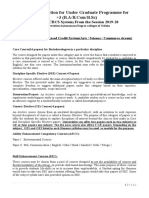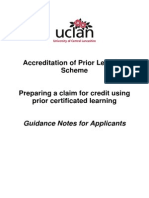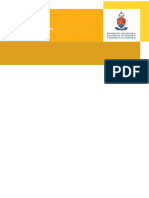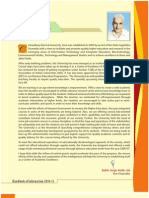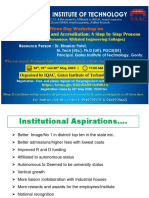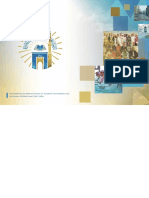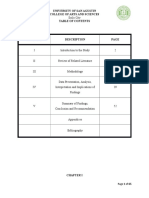Applications For Examination Allowances: Notes For Guidance For Staff and Students 2017-18
Applications For Examination Allowances: Notes For Guidance For Staff and Students 2017-18
Uploaded by
Sunny18Copyright:
Available Formats
Applications For Examination Allowances: Notes For Guidance For Staff and Students 2017-18
Applications For Examination Allowances: Notes For Guidance For Staff and Students 2017-18
Uploaded by
Sunny18Original Description:
Original Title
Copyright
Available Formats
Share this document
Did you find this document useful?
Is this content inappropriate?
Copyright:
Available Formats
Applications For Examination Allowances: Notes For Guidance For Staff and Students 2017-18
Applications For Examination Allowances: Notes For Guidance For Staff and Students 2017-18
Uploaded by
Sunny18Copyright:
Available Formats
EXAMINATION ALLOWANCES
NOTES FOR GUIDANCE
Contact: applications.committee@admin.cam.ac.uk
Applications for Examination Allowances
Notes for Guidance for Staff and Students 2017-18
These guidance notes are intended to complement the relevant University Ordinances and
they relate to applications submitted to the Committee in 2017-18.
They do not themselves constitute a set of regulations, nor should they be taken to imply
that, given a particular set of circumstances, the Committee will automatically reach a
particular decision.
The relevant Ordinances can be found online in Chapter III (Examinations) of Statutes and
Ordinances. (http://www.admin.cam.ac.uk/univ/so/2016/chapter03-section2.html)
Contents
1. Introduction
2. Forms of Examination Allowance
3. How to make an Application
4. Warning Letters
5. How the Applications Committee considers Applications
6. Returning to Study
7. Review Procedure
8. Key Contacts
Applications Committee Page 1 of 13 v1.0 2017-2018
1 Introduction
1.1 The Applications Committee
The Standing Committee on Applications is a committee of the Council which meets monthly
throughout the year to consider applications for examination allowances and related matters.
There is also a large volume of student casework undertaken under delegated authority
much of which involves the expert opinion of its Medical Advisers.
The Applications Committee has the following overarching aims:
To endeavour to ensure parity of treatment between applicants to the Committee who
share similar circumstances, whilst recognising that each case is individual.
To be mindful of the interests of students taking the same examination but who are
not applicants to the Committee.
To ensure that, particularly in relation to disregarding terms and repeating a period of
study, an applicant is neither advantaged nor disadvantaged in comparison with other
students.
1.2 Eligibility
The Applications Committee considers applications for examination allowances from
colleges on behalf of undergraduates and also on behalf of students on the following
postgraduate courses: EMBA; LLM; MASt; MBA; MCL; MEng; M.Fin; MMath; MMus; MSci;
PGCE.
It does not consider applications for those graduate students for which the Board of
Graduate Studies is responsible, nor does it consider applications for students being
examined for courses leading to the M.B, B.Chir or the Vet.M.B.
1.3 Purpose of an examination allowance
The primary purpose of the Application Committee is to consider the cases of students who,
due to medical or other grave cause, have been prevented from taking examinations, have
missed part of an examination or have failed or underperformed in an examination. Colleges
may apply for examination allowances on behalf of eligible students.
Applications Committee Page 2 of 13 v1.0 2017-2018
2 Forms of Examination Allowance
2.1 Types of Examination allowances and what they mean
DDH - the candidate is ‘declared to have deserved honours’.
This means that the evidence indicates that the student would normally have achieved
Honours in the examination or that, having been initially classed, the student’s class is
agreed, on the basis of evidence (e.g. supervision reports) to be unrepresentative of their
abilities.
DDH replaces any class initially awarded and appears against the overall result field on the
student’s transcript along with a statement from the regulations for allowances (reg 8) found
here. The papers that the student was enrolled for, and their marks where they exist, will also
appear on the student transcript.
DDH may not be awarded in an examination which is not for Honours (for example, the MASt
degree or an Erasmus student). DDH is not a classed award and may not be acceptable for
some professional requirements.
Allowed the examination.
This credits the student with the examination even though they have not met all of the normal
requirements. On the student’s transcript the words “Allowed the examination” appear
against the field for the overall result. All individual examination paper results also show on
the transcript, including any failures. “Allowed the examination” is not a class and may not be
acceptable for some professional requirements. This allowance may be offered in cases
where the examination is not an Honours examination (eg the MBA or the MASt degree).
Put in standing.
This gives the student permission to proceed to the next examination even though they have
not met all the normal requirements to do so. On the student’s transcript the record for that
academical year is blank. In cases where the student has completed less than three terms in
the year in question or has not completed the course for that year, the Committee may
decide to offer this allowance rather than DDH or allow the examination.
The Committee cannot put a student in standing for a Part III as entry to these requires
particular levels of previous academic performance. All it can do is to offer, if the Committee
so agrees, the relevant University academic authority an opinion on whether there are
mitigating circumstances which would warrant reconsideration of the case by that authority.
Ordinary BA degree (for Part II students only).
This is awarded to a student who has achieved Honours in a Part I but has failed at Part II,
IIA or IIB. Whilst each case is considered on its merits, an Ordinary BA may be the
appropriate outcome in instances where the student has, in the Committee’s opinion, made a
reasonable attempt at a Part II examination and has received reasonable supervision reports
but, in both aspects, below the standard that would justify a DDH.
Applications Committee Page 3 of 13 v1.0 2017-2018
Leave to disregard terms for a specified period.
Disregard terms is primarily for two reasons:
(i) to allow students to intermit their studies and be away from Cambridge for a period for
reasons of medical or grave cause, or
(ii) to put a student in standing for examinations.
Permission to disregard terms is normally granted for an academical year, however, in
certain circumstances, it may be granted for a calendar year or for another period. In these
cases, the college must check with the relevant Faculty / Department that a mid-year return
is academically feasible. A period of disregarded terms will not normally exceed three terms
or one year.
Applications to disregard terms for an academical year which are made during the Easter
Term of that year are not likely to be granted; the award of an examination allowance is more
likely.
Where a student is granted a period of disregarded terms, the College should indicate on the
application, for any of the candidate’s formally assessed work to be carried forward.
A student who has disregarded terms may not resume without the permission of the
Committee and their College.
Invite the Board of Examiners to reconsider its original result.
This is intended for a student who has performed at the standard of a higher class in all but a
relatively small part of the examination, where that small part of the examination was affected
by mitigating circumstances and where this is apparent in the student’s profile of results.
It is not intended for a student;
- who has generally underperformed for whatever reason, or
- whose medical circumstances affected the overall examination, or
- who is legitimately just below a borderline.
If the Committee approve the request, the Chair of the Board is invited to class the student
by disregarding the affected paper(s). Evidence is required of the mitigating circumstances
and that they affected those paper(s) to which the application is made, and not the whole
examination. Evidence is also required that the student’s academic performance was not as
expected in the affected part of the examination, so supervision reports should be submitted.
Additionally, for these applications, it is helpful if the College include the student’s
examination timetable.
Applications Committee Page 4 of 13 v1.0 2017-2018
2.2 Which allowance to apply for
The following table demonstrates which circumstances allow for which type of allowance;
Can a Invite the Board
Declared to Award
Is an Exam warning Disregard Allow the Put in of Examiners to Resume
have Deserved Ordinary
allowance? letter be terms examination standing reconsider its studies
Honours Degree
sent? original result
Student is absent for
YES YES YES YES YES YES YES* NO NO
whole exam
Student is absent for part
of the exam and not YES YES YES YES YES YES YES* YES NO
classed
Student attended whole
YES YES YES YES YES YES YES* YES NO
of the exam and failed
Student attended all or
part of the exam and has YES YES YES NO NO NO NO YES NO
obtained honours
YES* If student is Part II
Applications Committee Page 5 of 13 v1.0 2017-2018
3. How to make an application
3.1 General information
The Committee only considers applications made through the college on the student’s behalf,
except in the most exceptional circumstances. Students can apply directly to the Committee
where they are seeking a review of a decision by the Committee.
The application must be complete, i.e. it must include all the required documentation, a tutorial
signature and explicit confirmation as to whether or not it has the College’s support, and if it
does not, to confirm it has told the student so. Applications that have not had this information
completed may be returned, and this could delay the Committee’s consideration. The
application may also include any additional information which the college wishes to submit.
The student may, if they wish, seek to have their own statement or other supporting evidence
included. It is in all parties’ interests that any such statement is clear and concise. The
Committee regards it as good practice that the student should be fully aware of all the
documentation being submitted by the College.
An application must include all of the following:
• a completed and signed application form;
• a statement from the college;
• a completed declaration form from the student giving permission for medical evidence to be
disclosed to medical members of the Committee;
• evidence of medical circumstances or other grave cause;
• all supervision reports available for the academical year(s) to which an allowance would
apply. Where an application concerns an undivided two year Part I, reports for both years
should be provided. For courses where supervision reports are not routinely available (e.g.
the LL.M.), the College should supply whatever testimony of the student’s industry and ability
it can. Supervision reports should be provided in chronological order, most recent first;
• the profile of marks obtained in any examination attended and in any other formal component
of assessment completed throughout the year. It will assist the Committee if the examination
timetable and relevant marking and classing criteria are included.
Completed applications should be sent to the Secretary of the Applications Committee at
applications.committee@admin.cam.ac.uk . Please note that in fairness to all students and to
allow members sufficient time to read the papers, the submission deadline for each meeting of
Applications Committee Page 6 of 13 v1.0 2017-2018
the Committee is strictly observed. Details of meetings and submission deadlines can be found
at http://www.student-registry.admin.cam.ac.uk/about-us/applications-committee.
3.2 Medical Evidence
If the reason for the application is for medical reasons, evidence must be included with the
application. The following should be noted;
Medical evidence should be obtained prior to the completion of the examination. Post hoc
medical evidence will be regarded as such by the Committee and is unlikely to be given the
same weight as evidence which pre-dates an examination. Where a student’s referral to a
specialist medical advisor has been delayed for reasons outside the student’s control,
this should be made clear.
Evidence must be submitted by the deadline of the Committee meeting at which the college
would like the application to be considered. The Committee expects to receive evidence from
a medically qualified practitioner, for example a doctor’s report, preferably from a doctor
based in Cambridge.
Where appropriate, it will additionally consider evidence from an accredited counsellor.
If there is a disability element to the application, the Committee would normally expect to see
reference to consultation with the DRC.
In the case of short term debilitation, the Committee will consider evidence from a college
nurse. Statements by college nurses will generally suffice in instances of ‘routine’
illness and acute medical problems with measurable and visible symptoms
Evidence is required, as opposed to merely a declaration that the student was debilitated.
Supporting letters from relatives or friends, irrespective of whether they are medically
qualified, or anecdotal sources of information do not constitute medical evidence and are not
acceptable to the Committee.
The medical evidence should be a clear diagnosis which includes the nature and severity of
the illness; it should state how the condition is likely to have affected the student’s
examination preparation and / or performance or academic progress. The evidence should
be precise and self-explanatory.
The amount of evidence required will vary from case to case. For example, hospital
admission will need a shorter explanation than will a less obvious or less serious condition
where background information and details of the candidate’s medical history may be
required.
Applications Committee Page 7 of 13 v1.0 2017-2018
If the student is seeking permission to go out of residence on medical grounds, the medical
evidence should also indicate when the student is likely to be able to resume study and where
appropriate, include a clear medical plan identifying any necessary treatment to be undertaken
during the period out of residence.
Strict confidentiality is observed regarding medical evidence. Medical evidence is disclosed only
to the medical members of the Committee (although it is accepted that it will also be seen by the
Secretary and Assistant Secretary to the Committee and by College staff collating the
application). Other members of the Committee do not see this part of the application unless the
student explicitly asks that they should do so. The student is required to submit a form giving
permission for their medical evidence to be disclosed to the medical members of the
Committee.
3.3 Evidence of other grave causes
Mitigating circumstances which are not medical may be considered. A grave cause may have a
variety of characteristics but will include being (i) unanticipated and (ii) entirely beyond the
student’s control. In cases relating to grave cause, the Committee would expect to receive
evidence from an appropriate professional; the evidence should be independent and should
corroborate the college’s application. The Committee is not able to consider evidence from a
relative, friend or anyone with a close personal connection to the student or family.
The Committee will not normally approve applications for disregarded terms which are based on
employment opportunities, internships and the like. Applications made on grounds other than
medical, family or financial factors will generally only be considered if the opportunity presented
to a student is unique and cannot be deferred until completion of the student’s course of study.
3.4 College Statement
The student’s Senior Tutor or Tutor should submit a statement about the application. The
college may wish to draw attention to any matters which it would like the Committee to take into
consideration. There may be instances in which an additional statement by a DoS is
helpful. The Committee pays close attention to the care with which College statements
prepared.
Applications Committee Page 8 of 13 v1.0 2017-2018
4 Warning letters
During the examination period, a college may wish to alert the Committee that a student has
experienced a problem. This is called a “warning” and is submitted by the College via the
Student Information System, CamSIS. No action is taken at the submission stage.
If the college subsequently makes an application to the Committee on behalf of the student, the
fact that there was a warning will be disclosed to the Committee. If the college does not make
an application, no action is taken on the warning.
Warnings are not disclosed to Chairs of Examiners nor their Examination Boards. This is to
ensure that warnings, and the circumstances they describe, are considered consistently by one
Committee which has an overview of custom and practice across the University. An
Examination Board is asked to consider a student on the basis of the academic work presented.
If a college then considers that the outcome is not representative of the student’s proved ability,
the normal procedures for applying to the Committee should be followed.
Applications Committee Page 9 of 13 v1.0 2017-2018
5 How the Applications Committee considers applications
5.1 General overview
Members of the Committee normally receive applications seven days before the scheduled
meeting. Where necessary a second circulation of applications will be issued: but only in the
most exceptional circumstances will the Committee feel able to consider tabled applications.
Medical evidence is only sent to medical members of the Committee. If a college has previously
submitted a warning about a student during the examination this fact is now disclosed to
Committee members.
In considering the college’s application the Committee takes into account the evidence
submitted, the student’s academic performance throughout the year and where applicable
during the examination in question, and points raised in the college’s statement, and any
statement from the student.
Where the medical evidence is considered by the medical members to be weak or
unconvincing, the Committee may defer a decision until further appropriate evidence is
obtained, or it may propose an allowance other than the one requested, or it may decline the
application.
Where the academic evidence, primarily from supervision reports, is considered to be
insufficient to support the allowance requested, the Committee may propose an allowance other
than the one requested or it may decline the application.
Where the Ordinances refer to “small” or “substantial” parts of an examination, the Committee
does not have formulaic definitions of these terms. This reflects the fact that the number of
papers required in the various Parts of Tripos can vary considerably.
Only in really exceptional circumstances will more than one examination allowance be granted
to a student during their undergraduate career. Where the Committee gives a student
permission to disregard terms, this is not considered an examination allowance in this particular
context.
5.2 Matters dealt with by delegated authority
Some matters may be dealt with by authority delegated to the Chair and / or Secretary. Typically
this includes straightforward applications to return.
In very exceptional circumstances i.e. where a decision cannot reasonable wait until the next
scheduled meeting of the Committee and where the case is not straightforward, the Committee
may be prepared to consider an application by circulation. If, however, in such circumstances
any member of the Committee wishes the application to be considered at a scheduled meeting,
then the application will need to await that meeting.
Applications Committee Page 10 of 13 v1.0 2017-2018
6. Return to study
6.1 General
When considering a request to disregard terms, the Committee is mindful that it should not
bestow an advantage or a disadvantage on the student. Returning to repeat a year, or a part of
a year, which the student has successfully completed, or repeating an examination which the
student has already attempted, is normally declined. Examination allowances (DDH, put in
standing, allowance of the examination) are intended to accommodate these circumstances.
Where a student has been granted leave to disregard terms, the student does not have access
to University facilities, libraries, lectures etc. In the intervening period, it is the College’s
responsibility to monitor any course changes and to keep in close contact with the
Faculty/Department responsible for arranging student supervisions regarding the feasibility of
what is being proposed.
Where a student wishes to return, the college is required to apply to the Committee for
permission for the student to return. A student may not resume without obtaining this
permission. At this point, the college should also submit any required evidence of fitness to
return.
When a student returns, they may find that the content of the course and / or examination has
changed. No special provision is made for this and the student is expected to comply with the
course content and examination as required for that year.
Occasionally, in exceptional circumstances, this permission to disregard terms may be extended
beyond three terms. The circumstances would have to be very exceptional indeed for an
extension beyond two years. A further application should be made by the college to the
Committee for the extended period.
Where an overseas student disregards terms, there may be implications for the University and
for the individual student for visa requirements. In the first instance the college should contact
the International Student Team.
Applications Committee Page 11 of 13 v1.0 2017-2018
6.2 Evidence of fitness to return to study
When the Committee grants a student permission to have terms disregarded, it normally
attaches conditions of fitness to return. Evidence of these conditions having been met is
required before the point when the student intends to return. A student may not resume without
the permission of the Committee.
Wherever possible, medical evidence confirming fitness to return should be provided by the
same person who made the original diagnosis. Where this is not possible, the student should
arrange for the current practitioner, for example GP or consultant, to see the medical evidence
from the time of the original diagnosis to inform their judgement on the student’s fitness to
return.
The Committee and or the College may set other, non-medical, conditions before resumption.
For example, students may need to satisfy the requirements of a college examination or some
other form of academic assessment as a condition of returning from a period of disregarded
terms. These should be made clear to the student when permission to disregard terms is given.
The student should be in no doubt as to the nature of these conditions, what is required of
him/her and the deadline for satisfaction of such conditions. A clear statement of what facilities
(if any) and support will be made available to the student to meet any such conditions should be
given.
It is the student’s responsibility to obtain this evidence in time for the college to submit it by the
Committee’s deadline. If the evidence is delayed for reasons outside the student’s or the
College’s control, this should be made clear. The deadline for a college to apply for a student to
return for the academic year is 24 August; for the calendar year is 24 November; and for return
in the Easter term is 24 March. The college and student(s) should ensure that all the
documentation is ready for submission by that date.
In cases where continued medical treatment, including psychiatric treatment, is required, the
Committee needs to be satisfied that such treatment can satisfactorily be delivered in
Cambridge.
In the cases of disabled students returning from a period of disregarded terms, the Committee
would expect an indication that the DRC had been informed in order for any necessary support
to be ready from the resumption of the student’s studies.
Applications Committee Page 12 of 13 v1.0 2017-2018
7. Review procedure
Details of the Review Procedure and form can be found online and requests for review
should be submitted on the Review Request form within 14 days of the formal decision being
issued. It is particularly important for this purpose that the College keep records of when it
communicates the Committee’s decisions to the students. In instances where the Committee
has declined an application or offers an alternative to the allowance sought, it is essential
that the decision is conveyed to the student as soon as possible.
The review will essentially be of a procedural nature i.e. the Reviewer will consider whether
in reaching its decision(s) the Committee has observed the relevant Ordinances and these
Notes of Guidance and whether or not it has come to a reasonable decision in that context.
The Review Procedure is the final stage before the student may take their case to the Office
of the Independent Adjudicator.
8. Key contacts
Complex queries Jenny.green@admin.cam.ac.uk
General / preliminary queries applications.committee@admin.cam.ac.uk
Making an application to the Committee applications.committee@admin.cam.ac.uk
Applications Committee Page 13 of 13 v1.0 2017-2018
You might also like
- SITHKOP002 - Ass 2 - Project - Plan and Cost Basic Menus - v1.2022 (1) RevisedDocument53 pagesSITHKOP002 - Ass 2 - Project - Plan and Cost Basic Menus - v1.2022 (1) RevisedPadam DangalNo ratings yet
- UCP Vs BZU Examination Policies.Document11 pagesUCP Vs BZU Examination Policies.Birds Birds Hi BirdsNo ratings yet
- Microbiology Quiz: (A Handbook for Competitive Exam)From EverandMicrobiology Quiz: (A Handbook for Competitive Exam)Rating: 4 out of 5 stars4/5 (3)
- Student Guide To The Graduate Programs in Chemistry: University of New OrleansDocument32 pagesStudent Guide To The Graduate Programs in Chemistry: University of New Orleansbappy007No ratings yet
- Year11 Preliminary Assessment Book - 2024Document41 pagesYear11 Preliminary Assessment Book - 20244c945f8kd2No ratings yet
- Student Academic Appeal ProcedureDocument7 pagesStudent Academic Appeal Proceduredx.tnt19No ratings yet
- FAQs - Post Publication of Results 2023Document5 pagesFAQs - Post Publication of Results 2023mugwabanawangaNo ratings yet
- Microsoft Word - A101 Admissions Policy 2020-21Document7 pagesMicrosoft Word - A101 Admissions Policy 2020-21Samuel El-RefeeNo ratings yet
- 16 Evaluation of Student PerformanceDocument5 pages16 Evaluation of Student PerformanceChersia HaroNo ratings yet
- Academic BankruptcyDocument2 pagesAcademic BankruptcyUniversity of LouisvilleNo ratings yet
- Academic AppealsDocument6 pagesAcademic AppealsFeedback WebsiteNo ratings yet
- 5u-acad-regsDocument16 pages5u-acad-regstung.vnm2421227No ratings yet
- Mitigating Circumstances FormDocument8 pagesMitigating Circumstances FormHatem OmarNo ratings yet
- Centennial Grading PolicyDocument6 pagesCentennial Grading PolicyAlcibiades M-nNo ratings yet
- Model Regulation For Under Graduate Programme For: As Per CBCS System From The Session 2019-20Document21 pagesModel Regulation For Under Graduate Programme For: As Per CBCS System From The Session 2019-20Ompriya BeheraNo ratings yet
- F-MD Examination Regulations-Feb 2024Document39 pagesF-MD Examination Regulations-Feb 2024mwanzauniversitystudioNo ratings yet
- 6.2.2 Examination PolicyDocument8 pages6.2.2 Examination Policyskwrites16No ratings yet
- Universiti Sultan Azlan Shah - Scholarship OfferDocument4 pagesUniversiti Sultan Azlan Shah - Scholarship Offerbayoo sukmaangaraNo ratings yet
- Academic Policies for UG 2022-2026 and 2023-2027.docxDocument13 pagesAcademic Policies for UG 2022-2026 and 2023-2027.docxAbhay JainNo ratings yet
- PAO 2021 018 Alternative Grading SystemDocument3 pagesPAO 2021 018 Alternative Grading SystemJohn Ace AmbalanNo ratings yet
- Quick Guide To Mitigating Circumstances UoL 20222023Document12 pagesQuick Guide To Mitigating Circumstances UoL 20222023ckvr1610No ratings yet
- Policy Academic Standing - As of 2019-12-19Document5 pagesPolicy Academic Standing - As of 2019-12-19Peoples College of LawNo ratings yet
- Academic Standing Policy - As of 2019-10-20Document5 pagesAcademic Standing Policy - As of 2019-10-20Peoples College of LawNo ratings yet
- Me1111 PolicyDocument24 pagesMe1111 PolicyILEENVIRUSNo ratings yet
- 3 UG CBCS RegulationRevisedDocument21 pages3 UG CBCS RegulationRevisedAnil BagharNo ratings yet
- Policies Adopted by Board - As of 2019-2-18Document9 pagesPolicies Adopted by Board - As of 2019-2-18Peoples College of LawNo ratings yet
- 关于印发《温州肯恩大学国际生新生奖学金评选实施办法(2023年9月修订)》的通知Document7 pages关于印发《温州肯恩大学国际生新生奖学金评选实施办法(2023年9月修订)》的通知victorianojanergutierezNo ratings yet
- Academic Policies Adopted by Community Board - Passed April 19, 2018 (Rev. April 23, 2018)Document8 pagesAcademic Policies Adopted by Community Board - Passed April 19, 2018 (Rev. April 23, 2018)Peoples College of LawNo ratings yet
- Exam and GPA RegulationsDocument42 pagesExam and GPA RegulationsShanica Paul-RichardsNo ratings yet
- PersCircs AcademicAppeals Updated Nov23 FINALDocument20 pagesPersCircs AcademicAppeals Updated Nov23 FINALMantily HolmesNo ratings yet
- Discusion Unit 4 - PlagiarsimDocument4 pagesDiscusion Unit 4 - PlagiarsimmtisyanancyNo ratings yet
- NUS: YST Grading SystemDocument6 pagesNUS: YST Grading SystemNatalie KohNo ratings yet
- PHD Econ HandbookDocument8 pagesPHD Econ HandbookamudaryoNo ratings yet
- Orientation - 1st Day - 0Document45 pagesOrientation - 1st Day - 0pam pamNo ratings yet
- Law Five YearsDocument293 pagesLaw Five YearsersayantanNo ratings yet
- REG15 - 505 General Regulations For Foundation Degree Programmes 201516Document11 pagesREG15 - 505 General Regulations For Foundation Degree Programmes 201516johhnyenglish20No ratings yet
- 2020 Bed Programme InformationDocument13 pages2020 Bed Programme InformationTJPlayzNo ratings yet
- University Degree Requirements, Graduation, and CommencementDocument4 pagesUniversity Degree Requirements, Graduation, and CommencementVincentOreaNo ratings yet
- Graduate Handbook 2021 Finall - 05132021 - APDocument117 pagesGraduate Handbook 2021 Finall - 05132021 - APJennifer Abella BrownNo ratings yet
- MSC Agro ForeDocument15 pagesMSC Agro ForeRishabh TiwariNo ratings yet
- MC PolicyDocument13 pagesMC PolicyBalqisjamaludinNo ratings yet
- Student's Manual 2009-10: Hidayatullah National Law University, Raipur (C.G.)Document40 pagesStudent's Manual 2009-10: Hidayatullah National Law University, Raipur (C.G.)vijaya choudharyNo ratings yet
- Application Form For Leave of AbsenceDocument2 pagesApplication Form For Leave of AbsenceFarhan SaghirNo ratings yet
- Academic Affairs & RegulationsDocument7 pagesAcademic Affairs & RegulationsSamuri FirusiNo ratings yet
- Law 5 Year SyllabusDocument From SHATRUGHAN KUMAR-1Document310 pagesLaw 5 Year SyllabusDocument From SHATRUGHAN KUMAR-1itachikaisen76No ratings yet
- Student Eligibility Flowchart 2019Document1 pageStudent Eligibility Flowchart 2019api-372689299No ratings yet
- AQH-F21-1 Dual Award Regulations For The University of Sunderland and SEGi University, Kota Damansara, MalaysiaDocument5 pagesAQH-F21-1 Dual Award Regulations For The University of Sunderland and SEGi University, Kota Damansara, MalaysiaPritib KumarNo ratings yet
- Dj - Exam Guidelines (for Students)_revisedDocument29 pagesDj - Exam Guidelines (for Students)_revisedmhapralkarmalhar08No ratings yet
- Student Services Centre Deferral Application: First Name and Surname Student Number Program of StudyDocument3 pagesStudent Services Centre Deferral Application: First Name and Surname Student Number Program of StudysajanaNo ratings yet
- UFS LLB Degree Student Information Guide 2015 v1Document14 pagesUFS LLB Degree Student Information Guide 2015 v1Panashe ChifambaNo ratings yet
- Fanshawe Grading PolicyDocument7 pagesFanshawe Grading PolicyMattSmithNo ratings yet
- APCL Applicant HandbookDocument9 pagesAPCL Applicant Handbookanees jamalNo ratings yet
- Exemption and Credit Transfer PolicyDocument14 pagesExemption and Credit Transfer PolicyDomin9656No ratings yet
- 2021 BEd Programme Information FINAL Ammended 24 Feb 2021 FINDocument13 pages2021 BEd Programme Information FINAL Ammended 24 Feb 2021 FINatetema0407No ratings yet
- Humanities Guidance For Staff Mitigating Circumstances FINAL v1.1 280520Document10 pagesHumanities Guidance For Staff Mitigating Circumstances FINAL v1.1 280520Aryan PandeyNo ratings yet
- Academic - Appeal-Form - Sama KargboDocument8 pagesAcademic - Appeal-Form - Sama Kargbodamalaiyansaneh03No ratings yet
- SAP MBA ProgramDocument10 pagesSAP MBA ProgramWho Am iNo ratings yet
- What Every Successful Physics Graduate Student Should KnowFrom EverandWhat Every Successful Physics Graduate Student Should KnowRating: 4 out of 5 stars4/5 (3)
- Summer Internship Project Report On "Bansal Brothers": (Session 2021-2022)Document32 pagesSummer Internship Project Report On "Bansal Brothers": (Session 2021-2022)Sunny18No ratings yet
- Module 4 Managing The VentureDocument29 pagesModule 4 Managing The VentureSunny18No ratings yet
- Bitcoin in India: A Deep Down Summary: October 2019Document6 pagesBitcoin in India: A Deep Down Summary: October 2019Sunny18No ratings yet
- BBA II May 2013 368067001Document9 pagesBBA II May 2013 368067001Sunny180% (1)
- Guidelines On How To Approach and Answer Case StudiesDocument49 pagesGuidelines On How To Approach and Answer Case StudiesSunny18No ratings yet
- New Doc 2019-10-03 13.58.56Document20 pagesNew Doc 2019-10-03 13.58.56Sunny18No ratings yet
- New Doc 2019-10-08 00.04.11 - 20191008000928Document16 pagesNew Doc 2019-10-08 00.04.11 - 20191008000928Sunny18No ratings yet
- Modern Manners Tools To Take You To The TopDocument1 pageModern Manners Tools To Take You To The TopSunny18No ratings yet
- It16 17Document44 pagesIt16 17Srikant PotluriNo ratings yet
- Amalan Sop NsiaDocument2 pagesAmalan Sop NsiaSanooj RemegiusNo ratings yet
- Advt. No.9-2018 - 0 PDFDocument7 pagesAdvt. No.9-2018 - 0 PDFMuhammad TayyabNo ratings yet
- Education System of Sri Lanka During The Portuguese and The Dutch PeriodDocument8 pagesEducation System of Sri Lanka During The Portuguese and The Dutch PeriodPGIndikaNo ratings yet
- Hand-Book-Of-Information - CHDocument85 pagesHand-Book-Of-Information - CHYOGESH MUNEJANo ratings yet
- University of Southern Mindanao - Guidance ProgramDocument4 pagesUniversity of Southern Mindanao - Guidance ProgramEngr Grace DT PNo ratings yet
- Moot-Proposition 27th KeralaDocument2 pagesMoot-Proposition 27th KeralaNiteshMaheshwariNo ratings yet
- Argument Essay DinaDocument3 pagesArgument Essay DinaCici Novelia ManurungNo ratings yet
- Powers and Duties of Governing BoardsDocument3 pagesPowers and Duties of Governing Boardsdexter lingbananNo ratings yet
- Youth BookDocument13 pagesYouth Bookalissa apelNo ratings yet
- Republic Act No. 6506Document5 pagesRepublic Act No. 6506Jay-arr ValdezNo ratings yet
- Level 3 Foundation Diploma For Higher Education StudiesDocument3 pagesLevel 3 Foundation Diploma For Higher Education StudiesGibsonNo ratings yet
- Comp SY-BTech-CE-Curriculum-and-Syllabi-v2 PDFDocument56 pagesComp SY-BTech-CE-Curriculum-and-Syllabi-v2 PDFerbavNo ratings yet
- Ap State StastiticalDocument15 pagesAp State StastiticalManoharNo ratings yet
- Naac-Fdp-Gates Institute of Technology PDFDocument151 pagesNaac-Fdp-Gates Institute of Technology PDFRupa GanguliNo ratings yet
- Engineering Colleges in DehradunDocument11 pagesEngineering Colleges in DehradunEngineering CollegeNo ratings yet
- Islamic University Book PDFDocument64 pagesIslamic University Book PDFfaruq0% (1)
- HardTimes2015 ReportDocument52 pagesHardTimes2015 ReportrupertaveryNo ratings yet
- F. Y. B. Com. (From June 1999) : Faculty of CommerceDocument166 pagesF. Y. B. Com. (From June 1999) : Faculty of CommerceShivam YadavNo ratings yet
- Notification Rules For Affi Tech InstitutionsDocument17 pagesNotification Rules For Affi Tech InstitutionsUmair Shafique KhanNo ratings yet
- Russ Resume 2Document2 pagesRuss Resume 2RussellhauckNo ratings yet
- College of Dairy Technology KamareddyDocument4 pagesCollege of Dairy Technology KamareddySangameshwar LabhishettyNo ratings yet
- Marlyn A. Resurreccion: Lecturer or Instructor (English Language)Document5 pagesMarlyn A. Resurreccion: Lecturer or Instructor (English Language)Eddie Resurreccion Jr.No ratings yet
- NZTC Application Form (Education) V 16 1 EditableDocument11 pagesNZTC Application Form (Education) V 16 1 EditableSaNo ratings yet
- Belmont Abbey College - CASE STUDYDocument9 pagesBelmont Abbey College - CASE STUDYmenouar.rania30No ratings yet
- Best Thesis EditedDocument65 pagesBest Thesis EditedAaron ReyesNo ratings yet
- Practical Issues Arising During Trust AdministrationDocument63 pagesPractical Issues Arising During Trust Administrationmalaika12100% (1)
- Management of Private-Aided Higher EducationDocument23 pagesManagement of Private-Aided Higher EducationtauranNo ratings yet
- Getting A Medical Qualification in England in The Nineteenth CenturyDocument7 pagesGetting A Medical Qualification in England in The Nineteenth Centurybarbarag77No ratings yet
- AE (Stott's College) - Term Sheet For AGB TrainingDocument2 pagesAE (Stott's College) - Term Sheet For AGB TrainingAmrezaa IskandarNo ratings yet














